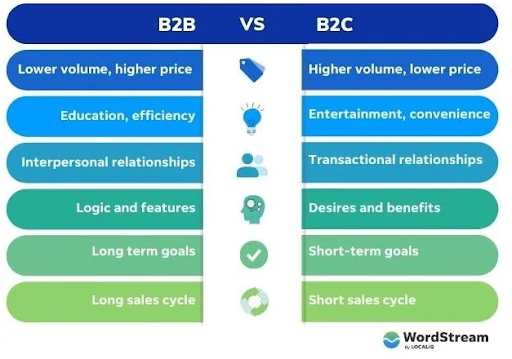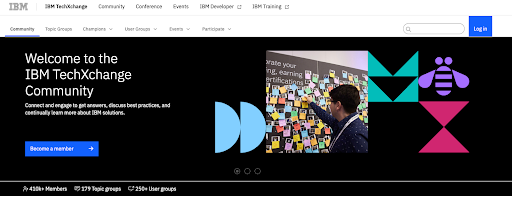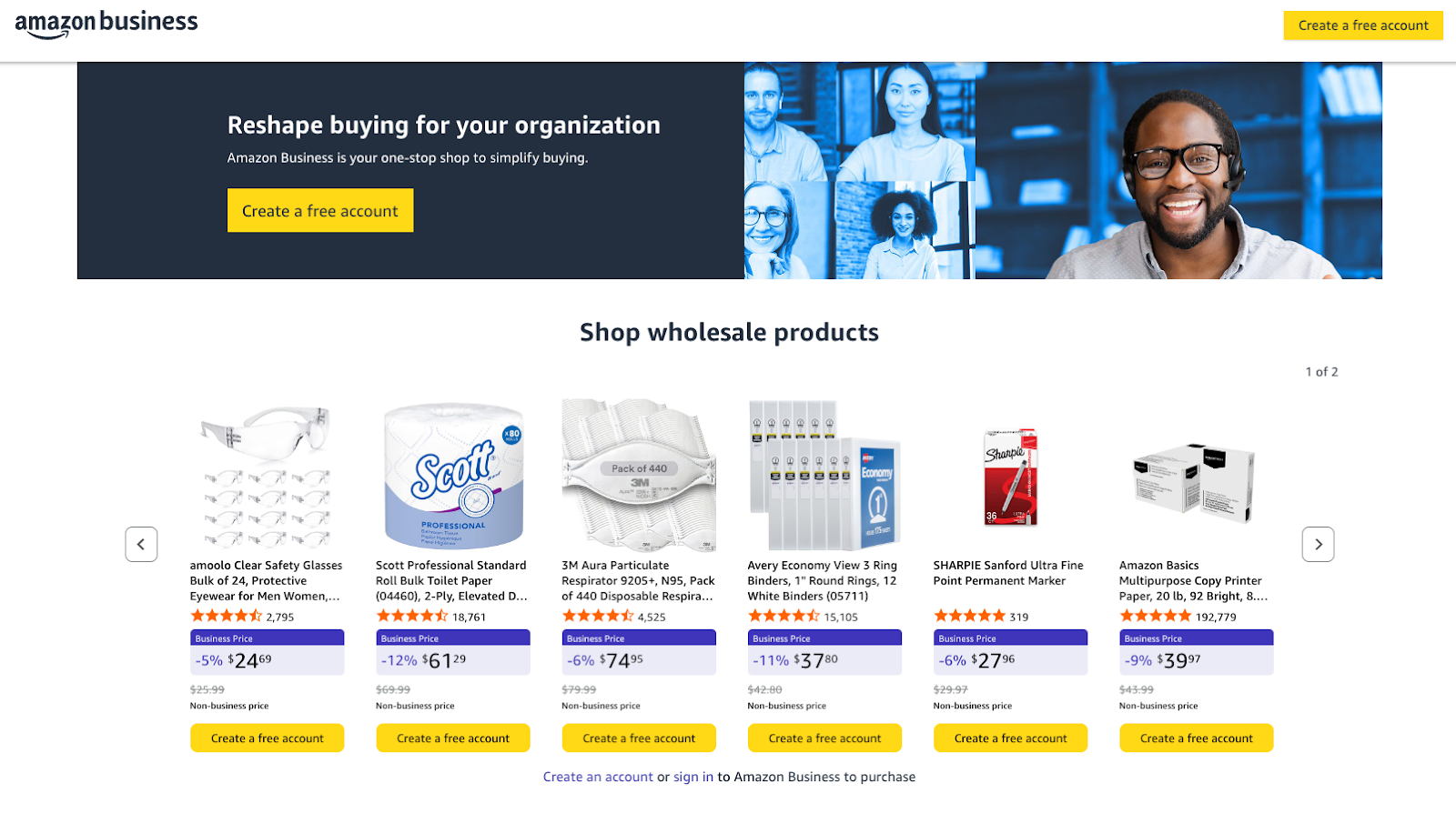
In marketing, there are two primary paradigms: Business-to-business (B2B) and business-to-consumer (B2C) marketing. Knowing the differences between B2B vs. B2C marketing, along with where they converge in today’s landscape, can help you develop a strategy effectively targeting either or both markets.
In this blog, Cooper Anderson, our Director of Sales, will discuss B2B marketing vs. B2C marketing, areas of convergence, and some best practices for both approaches.
What’s Covered:
- Differences Between B2B and B2C Marketing
- Data-Driven Marketing and Analytics
- Digital Transformation and Technology Integration
- Convergence and Cross-Pollination of Strategies
My Expert Insights into B2B vs. B2C Marketing
While B2B markets comprise businesses and professionals seeking products and services to help them achieve long-term, sustained business growth, B2C markets consist of everyday consumers looking for offerings to help them in their daily lives.
In some cases, businesses might market to both types of consumers. One example could be a furniture design company that designs and manufactures furniture for homeowners and businesses.
Knowing the right approach to take based on your vertical and its nuances could help you figure out how best to market your brand and offerings. Factors like your target market, pricing, and customer relationship will influence your strategy, helping you establish a strong connection with customers.

Differences Between B2B and B2C Marketing
When trying to figure out how to connect with your audiences through marketing, there are some nuances to consider between B2B vs. B2C marketing.
Here are some of the specific consumer market and business market differences and how they will impact your marketing approach.
Target Audience
One of the primary factors to think about is the business market vs. consumer market audience.
What is the B2C experience? B2C audiences tend to be your day-to-day shoppers, who make up a very broad audience. These shoppers will want to know how a product or service can resolve a particular pain point.
Compared to consumer markets, B2B markets are much narrower and more niche, targeting professional decision-makers to help them dominate their industries. Business customers will be considerably more specific, requiring B2B companies to target these audiences based on industry, revenue, company size, and other factors.
Pricing
When comparing B2B vs. B2C, you also need to take pricing into account.
Businesses tend to have a large allocated budget to work with that they’re looking to invest in an offering and, in some cases, a long-term partnership. Conversely, the average consumer is working with a tighter budget, and they’ll want a product or service that’s affordable based on their income and budget for essentials and non-essentials.
Although some B2C audiences may have higher budgets to work with, especially in industries selling luxury items, B2B markets tend to be the ones with the largest spending potential.
Purchase Volume
The volume of sales factors greatly into the difference between B2B vs. B2C marketing.
Because many B2C products and services are at significantly lower price points than their B2B counterparts, companies in these industries must maximize sales and customer lifetime value (CLV) to achieve their business goals.
Meanwhile, B2B companies tend to require fewer sales to reach their targets, but they must also hone in on high-value accounts to maintain profitability. Compared to consumer markets, B2B markets are more about focusing on quality than quantity.
Decision-Making Process
Because B2C purchases tend to require less of a commitment, consumers typically don’t take as long to make a buying decision as B2B customers. However, B2C audiences may still need to do some research before buying.
B2B audiences, on the other hand, will need more time and research to influence their final decisions, as they want to ensure their purchases protect and improve their bottom line. In fact, the decision-making process could involve multiple key figures within a company to contribute to the purchasing decision. For example, someone within a company might want to invest in software that could increase operational efficiency, but they may need to get approval from higher-ups, followed by price negotiations.
In turn, you can expect the B2B decision-making process to take longer than that of B2C markets.
Marketing Approach
Consider the kinds of marketing channels your audience uses and the best ways to reach prospective customers.
In the B2C market, content tends to go in a more fun and entertaining direction. As such, you might use all types of engaging content to connect with these audiences, including social media sponsorships, TikTok videos, and YouTube Shorts.
With B2B marketing, it’s more about moving leads down the sales funnel toward a sale in a methodical way. Product demos, professional messaging, and value-based content will go a long way in driving conversions here.

Customer Relationship
The commitment to a B2B purchase also means that these audiences will want more personalized, tailored services and solutions that meet their specific business needs. B2B marketing and sales teams will collaborate to establish and nurture relationships with decision-makers, in many cases offering scalability as the customer’s business needs change over time.
B2C customers also benefit from and want to see personalization from the companies they trust. According to Statista, around 64% of consumers in a recent study expressed that they would prefer to buy from companies offering personalized experiences. At the same time, they want to know that their data is secure when engaging in these experiences.
Emotional vs. Rational Appeals
When considering B2B vs. B2C marketing, it’s also important to think about the right marketing approach to take based on what will appeal to your audience.
B2B audiences tend to be more driven by logic, with B2B marketing employing rational, value-based messaging. B2B customers want to know that a purchase is worthwhile and will help them succeed in their business ventures.
B2C customers lean more in the other direction, responding more to emotional appeal. They want you to empathize with them and build a connection using anything from humor to love.
Keep in mind that B2B audiences do respond to emotional brand messaging, though. One study by Peter Field and Les Binet for the LinkedIn B2B Institute discovered that emotional strategies are 7 times more effective at building long-term growth over conventional rational B2B marketing. Some emotions that appeal to this audience include confidence, hope, and optimism.

Data-Driven Marketing and Analytics
B2B and B2C data collection and analysis also differ from each other.
Audience Data
When collecting data about your target audiences, you will want to collect different types of data based on each audience’s needs. Let’s look closer at B2B vs. B2C marketing data.
Generally, B2B companies will want to collect data related to organizations and decision-makers to connect with potential leads.
Some elements here will include:
- Company size
- Location
- Industry
- Job titles
B2C, on the other hand, will focus on data about individuals to help with targeting consumers.
Here are some pieces of data that could inform your B2C strategy:
- Age, location, gender, and other demographics
- Interests
- Purchasing habits
- Interactions with marketing content
Using Data to Drive Decisions and Strategy
The way you go about optimizing B2B marketing vs. B2C marketing will also be different.
For example, in B2B marketing, you would likely use account-based marketing (ABM), collecting firmographic data that goes into an organization’s industry, revenue, and other factors to influence targeting, lead generation, and lead nurturing efforts. In doing so, you might use lead scoring, tracking website visits, demo downloads, or other types of lead behaviors to identify high-value opportunities.
B2C marketing strategies, meanwhile, will focus on segmenting customer types based on purchase history, loyalty, and online behavior. The data you collect could include revenue and audience interactions to build better brand awareness or boost sales.
Unique Tools and Metrics for Each Industry
Also, consider the best tools to use for B2B and B2C marketing campaigns and audience data.
Some popular B2B tools include:
- Account-Based Marketing Platforms: Using these solutions, B2B marketing strategies can benefit from the ability to identify the most valuable leads with in-depth analytics and account intelligence. Some examples of ABM platforms include RollWorks, Demandbase, Marketo, and 6sense.
- Sales Intelligence Solutions: B2B sales teams can use these platforms to collect contact and company data to help with sales strategies. LinkedIn Sales Navigator, Cognizm, and ZoomInfo are popular options.
- Customer Relationship Management (CRM) Tools: Nurturing leads could involve a CRM to track lead journeys and determine how to more efficiently move leads from initial touchpoints to sales. There are many B2B-ready CRM tools out there, such as Salesforce, HubSpot, and Zoho CRM.
The following are some critical metrics to track using these tools:
- Leads generated: Tracks the number of potential business customers who have entered the sales funnel.
- Cost per lead (CPL): Determines how much it costs to acquire new leads.
- Conversion rates: The percentage of leads that turn into customers.
- Return on investment (ROI): The total amount of revenue earned against all marketing expenses.
- Customer lifetime value (CLV): Measures the overall value of each customer over the course of their relationship with a brand.
If you want to develop strong B2C marketing strategies, here are some B2C-centric tools to use:
- Customer Journey Mapping Tools: Tools like Woopra and Userpilot allow you to track customer journeys at every stage, giving insights into user behaviors throughout.
- Segmentation Platforms: When segmenting target audiences, you might use tools to help with this process, including Mailchimp for developing personalized email campaigns and Kissmetrics for segmenting website visitors.
- Analytics and Behavior Tracking Tools: Use these tools to track user behavior on your website as well as engagement data, including traffic, page session duration, and other vital metrics. Google Analytics is one of the most commonly used tools to track user behavior, but others like Hotjar can record user behavior via session recordings, heatmaps, and other features.
Using these solutions, you could track the following for B2C campaigns:
- Sales: Keeps track of sales revenue to gauge the profitability of marketing campaigns.
- Share of voice (SOV): Measures a brand’s overall presence in its industry compared to the competition.
- Social media engagement: Likes, shares, clicks, and other metrics on social media platforms count toward engagement metrics.
- Repeat purchase rate: Tracks how often people make repeat purchases from a brand, indicating loyalty.
- Brand awareness and sentiment: Surveys, social listening, and other methods could indicate how visible a brand is and the public’s opinion about it.
Digital Transformation and Technology Integration
As technology continues to develop, it’s becoming easier than ever to optimize B2B and B2C marketing strategies with the latest tools.
More specifically, AI has made its way into nearly every platform and solution to help fully optimize strategies. AI can easily analyze customer data to provide you with valuable insights that improve decision-making, while dynamic content can allow for more personalized marketing campaigns.
AI can also automate various processes like data entry, lead scoring, and sending emails, allowing you to focus more on growing your business.
In the B2B market, account-based campaigns can use AI to more efficiently pinpoint high-value leads to maximize profitability, while B2C verticals can use it to optimize the customer journey for more sales.
Convergence and Cross-Pollination of Strategies
While there are many consumer market and business market differences, they sometimes converge as trends change.
More specifically, many B2B campaigns are now taking a more emotional approach to marketing, while more B2C campaigns are beginning to take more strategic and value-driven approaches to marketing.
For example, while account-based marketing is typically ideal for B2B marketing, certain B2C companies might focus on more high-value customers through personalization efforts, maximizing repeat sales and loyalty among the customers who are the best fit.
Also, B2B brands like IBM are implementing user-generated content (UGC), which tends to be more popular among B2C markets. In IBM’s case, the company has a Data Science Community that allows people to “Join the Discussion” about certain industry data science topics, essentially creating a niche forum and community.

For brands that try to appeal to both markets, it might be best to take a hybrid approach to marketing that reaches out to both markets in unique ways. For example, Amazon includes a dedicated Amazon Business channel for its B2B users in addition to its ecommerce platform for B2C customers, with separate marketing for both, such as product recommendations for B2C audiences and affiliate marketing update emails for professionals trying to earn with Amazon sales.

Get the Results You Want From B2B or B2C Marketing With Ignite Visibility
Want to take your marketing to the next level? The marketing experts here at Ignite Visibility have plenty of experience developing both B2B and B2C strategies. We can learn the ins and outs of your business to develop a strategy that reaches your audiences the right way.
Some of the ways we can help include:
- Identifying your target audience
- Developing a comprehensive marketing campaign based on B2B or B2C needs
- Putting together top-quality content that drives conversions and sales
- Continually measuring and optimizing campaigns using the latest tools
- And more!
Want to get started?
Contact us today to find out what we can do and get started on your next strategy.
